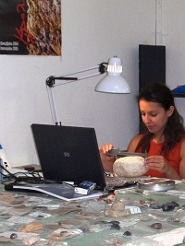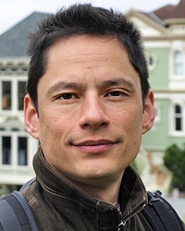Two Marie Curie Fellowships
The Laboratory of Material Culture Studies welcomes two new researchers in October 2013. Dr. Christina Tsoraki and Dr. Benjamin Tun-Yee Chan, both from the Department of Archaeology of the University of Sheffield, received a Marie Curie research fellowship and will perform their research for 24 months under the guidance of Prof. Dr. Annelou of Gijn.
Dr Christina Tsoraki
Crafting networks in early farming societies: tracing the residues of Neolithic activities through the study of stone artefacts .

This project investigates the role of technology in the development of social networks in early farming societies through an interdisciplinary research strategy that integrates stone technology and functional analysis with a wide range of other inorganic and organic materials (e.g. plants, animal bones, pottery, shells). This interdisciplinary approach is needed to address a key research question in the study of many different societies: how do changing strategies and technologies of production constrain and shape social relations? The Neolithic period, a crucial phase in human history characterised by diverse technological and social changes, presents an excellent context to explore this issue.
A crucial step in understanding the technological and social networks that structured the life of Neolithic communities is to establish the nature, range and social context of craft and food-processing activities taking place within Neolithic settlements. Three archaeological sites of critical importance in the Neolithic of Europe, that date between ca. 7400 and 3100 BC, are chosen as case studies (Çatalhöyük, Knossos, Makriyalos). The character of activities will be established scientifically through the application of microwear and residue analysis techniques. Central to this project is the integration of scientific approaches with a broader theoretical framework for understanding technological acts, cross-craft interactions and contexts of social interaction in Neolithic communities
.
Dr. Benjamin Tun-Yee Chan
Home sweet home: investigating Neolithic houses in Britain through the microwear and residue analysis of tools.

The aim of this project is to investigate the role of the house and the household in the development of Neolithic societies in Britain. Starting from the premise that the areas within and around houses are fundamentally places defined by activities (food preparation, eating, craft activities, tool production and maintenance etc.), Benjamin Chan will explore how the house and the household was constituted through material practices. This will be achieved by reconstructing the range, character and spatial arrangement of house activities through the scientific analysis of the artefacts that were associated with them. This will take place in three forms; the macroscopic analysis of tool types and the analysis of residues and microscopic traces of wear left on tools. The project will focus on analysing material from some of the best-preserved Neolithic houses in Britain and will compare the use of structures in Neolithic Orkney with houses at the settlement site of Durrington walls, which lies close to Stonehenge.
- Christina Tsoraki
- Ben Chan
- Material Culture Studies Faculty of Archaeology Leiden University
- Prof. Dr. Annelou van Gijn
